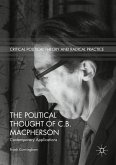--Kevin Morgan, Emeritus Professor of Politics and Contemporary History, University of Manchester UK
"Harold Laski, the Reluctant Marxist provides a refreshingly new take on Laski's political thought, that enriches standard readings of Laski's transition to Marxism and highlights Laski's flexibility and innovation as a thinker. Essential reading for critics of liberalism and those interested in accounts of sovereignty and the capitalist state."
--Jeanne Morefield, Associate Professor of Political Theory, Department of Politics and International Relations, Oxford
This book examines Harold Laski's relationship to Marxism. Laski was a reluctant Marxist; he had been a pluralist, democratic socialist who wanted to reach a better society by means of parliamentary, constitutional and associational channels. In fact, he never abandoned these early aspirations. In the 1930s and 1940s he wove them into a distinctive Marxist position as he gradually came to believe that there was no answer to Marxist philosophy on history, social change and the prospects for socialism. It is the incorporation of his earlier political thought into his later work that makes his Marxism so fascinating and his work raises important questions.
Harold Laski's Marxism aims to bring a relatively forgotten political theorist back into the spotlight. Peter Lamb provides an overview to Laski's political thought in the 20th century and explores his connections to essential foundations of Marxist thought. He ends with a discussion of ways in which Laski's Marxism is of lasting significance and can contribute to more recent Marxist and neo-Marxist debates.
Peter Lamb now retired, was Associate Professor of Politics and International Relations at Staffordshire University, UK. He is the author of many books, including Socialism (2019), The First Marx: A Philosophical Introduction, with co-author Douglas Burnham (2018), and Harold Laski: Problems of Democracy, the Sovereign State, and International Society (Palgrave Macmillan, 2004).
Dieser Download kann aus rechtlichen Gründen nur mit Rechnungsadresse in A, B, BG, CY, CZ, D, DK, EW, E, FIN, F, GR, HR, H, IRL, I, LT, L, LR, M, NL, PL, P, R, S, SLO, SK ausgeliefert werden.









